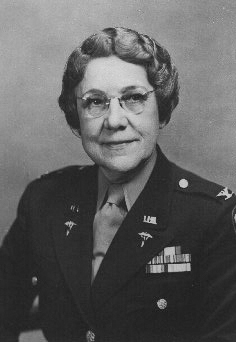Florence A. Blanchfield facts for kids
Quick facts for kids
Florence Aby Blanchfield
|
|
|---|---|

Colonel Florence A. Blanchfield
|
|
| Born | April 1, 1884 Shepherdstown, West Virginia |
| Died | May 12, 1971 (aged 87) Washington, D.C. |
| Allegiance | |
| Service/ |
|
| Rank | |
| Commands held | Superintendent of the Army Nurse Corps |
| Battles/wars | World War I World War II |
| Awards | Distinguished Service Medal Florence Nightingale Medal |
Florence Aby Blanchfield was a very important United States Army Colonel and leader of the Army Nurse Corps. She was born on April 1, 1884, in Shepherdstown, West Virginia, and passed away on May 12, 1971, in Washington, D.C.. She led the Army Nurse Corps from 1943 to 1947.
Florence Blanchfield received the Distinguished Service Medal in 1945. This is a very high award for special service. In 1951, she also received the Florence Nightingale Medal from the International Red Cross. This award honors nurses who show great courage and dedication. In 1947, she made history by becoming the first woman to officially join the regular army as a commissioned officer.
Contents
Early Life and Education
Florence Aby Blanchfield was the fourth of eight children. She was born in Shepherdstown, West Virginia. Her mother, Mary Louvenia, was a nurse, and her father, Joseph Plunkett, worked with stone.
Florence grew up in Oranda, Virginia. She went to public school until 1898. After that, she attended the private Oranda Institute. Nursing seemed to run in her family. Not only was her mother a nurse, but two of her sisters also became nurses. Her grandfather and an uncle were doctors too!
In 1906, Florence graduated from the Southside Hospital Training School. She then continued her studies at Johns Hopkins Hospital.
A Career in Nursing
Florence Blanchfield started her career as an operating room supervisor. She worked at Southside Hospital and Montefiore Hospital in Pittsburgh, Pennsylvania. In 1909, she became the superintendent of a training school at Suburban General Hospital in Bellevue, Pennsylvania. Later, in 1913, she worked as an operating room nurse and helped patients with anesthesia at the Ancon Hospital in the Panama Canal Zone.
Serving in World War I
During World War I, Florence joined the US Army Nurse Corps (ANC). She served as an acting chief nurse in Angers, and Coëtquidan, France. She was there from August 1917 to January 1919. She worked in many military hospitals during this time. After the war, she left the army for a while. However, she soon returned to active service.
Leading the Army Nurse Corps
In 1935, Florence was sent to Washington D.C. She worked in the office of the superintendent, dealing with staff matters for the corps. She became the assistant superintendent in 1939. Then, in 1942, she became the acting superintendent. Finally, she served as the official superintendent from June 1, 1943, until September 1947.
Florence Blanchfield played a huge role in getting full military rank for nurses. This was made possible by the Army and Navy Nurse Corps Law on April 16, 1947. Before this, nurses had only temporary officer status, which was granted in 1944. During World War II, she also saw the Army Nurse Corps grow very quickly. It went from just a few hundred members to more than 50,000! In 1947, she became the first woman to receive a full military commission in the regular army. This was a major step for women in the military.
Awards and Recognition
For all her amazing work for the Army Nurse Corps, Florence Blanchfield received the Distinguished Service Medal in 1945. She also received the Florence Nightingale Medal from the International Red Cross in 1951. In 1963, she was given West Virginia's Distinguished Service Medal.
Florence Blanchfield is buried at Arlington National Cemetery. Her grave is in section 21, site 641.
Legacy
To honor her, the Colonel Florence A. Blanchfield Army Community Hospital was named after her in 1982. This hospital is located at Fort Campbell, Kentucky.
Images for kids
 | Delilah Pierce |
 | Gordon Parks |
 | Augusta Savage |
 | Charles Ethan Porter |


